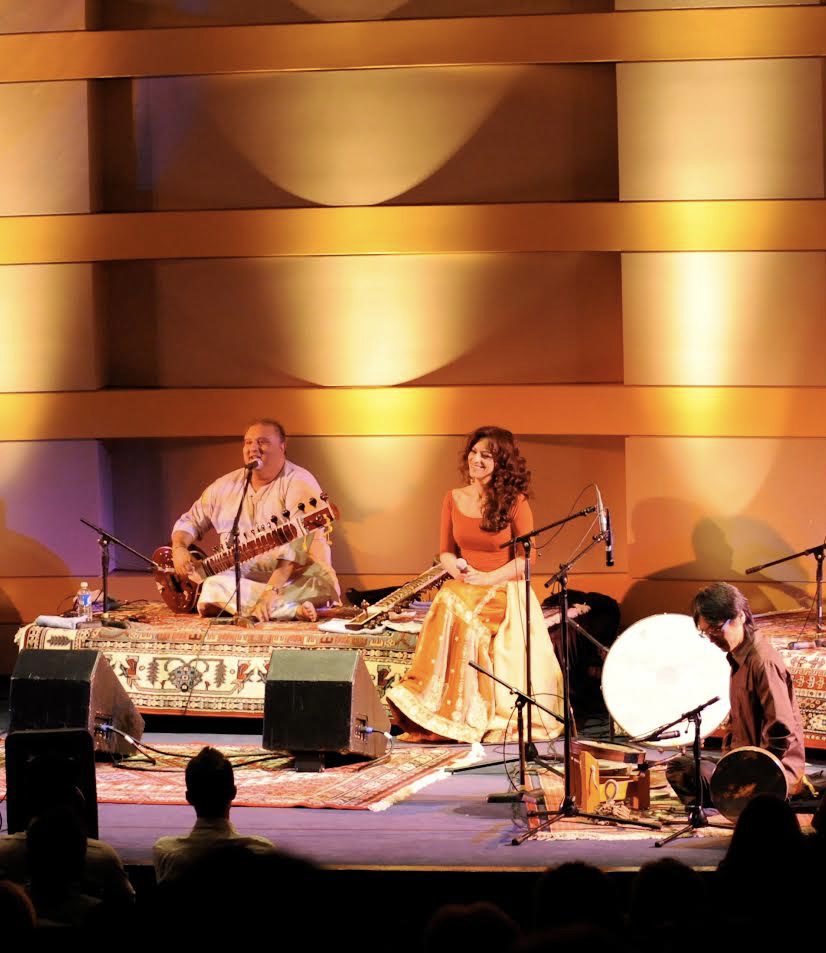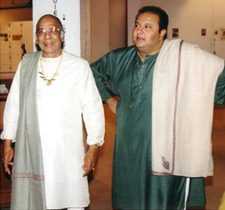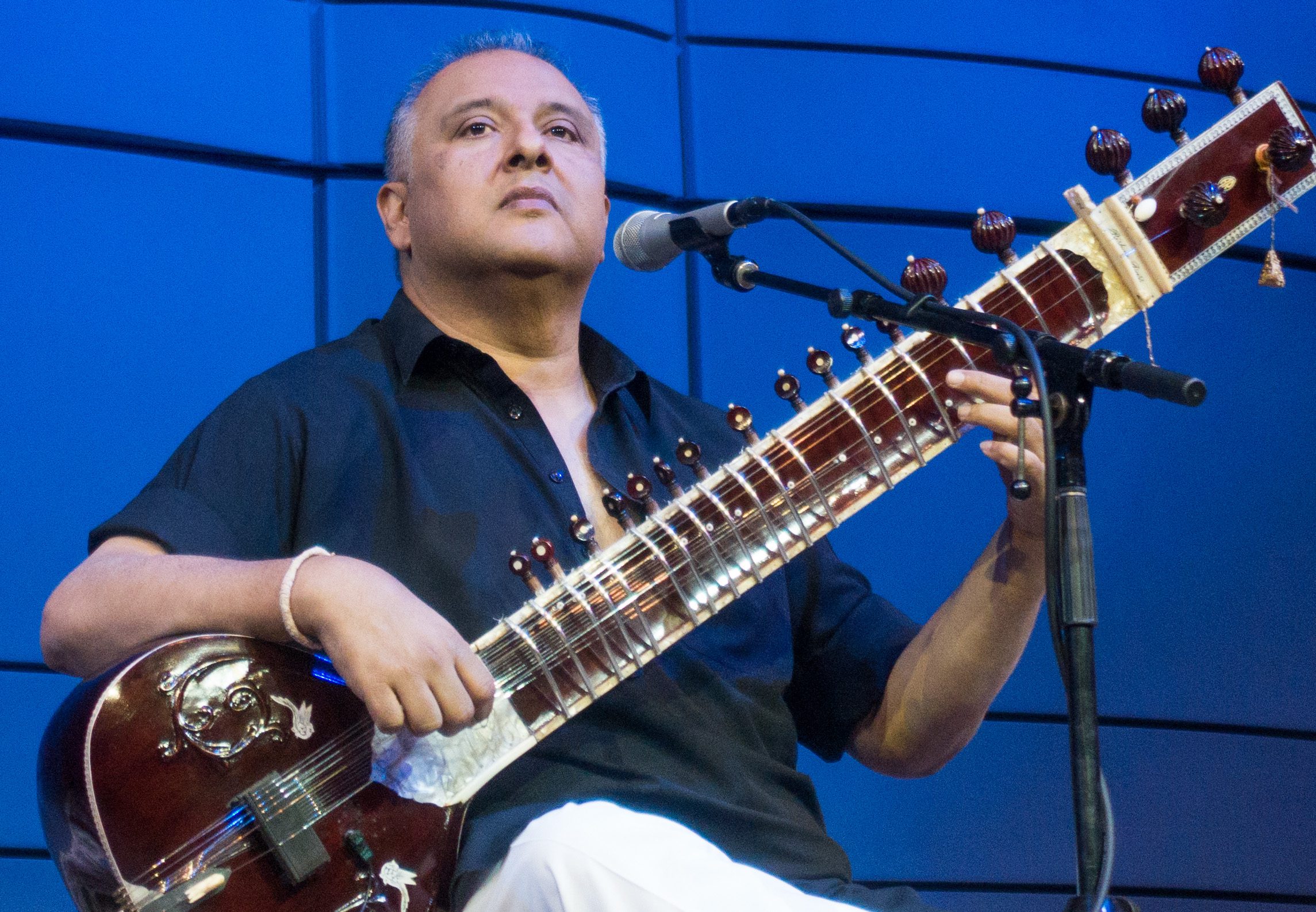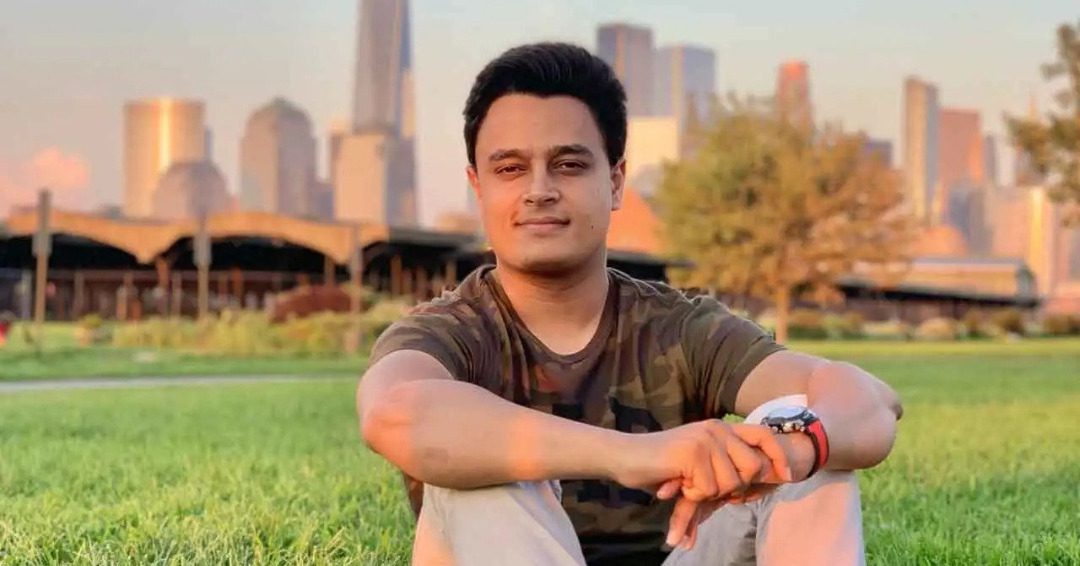(September 27, 2021) Shujaat Husain Khan was barely three when he began strumming a sitar that was specially made for him. Each time he ran his tender fingers up and down the strings or pressed them down onto the fret, the changing sounds intrigued the toddler and captured his imagination. He started playing the instrument for hours every day. By the age of six, Khan was recognized as a child prodigy and he got down to giving public performances. Each time he pressed or pulled the strings of his sitar, the world took note of it.
His approach to rhythm, which is spontaneous, intuitive and delightfully fresh is what astonishes his audience till date.

Shujaat Husain Khan during a performance
“I was born into a great family and I grew up under the ‘Chatrachaya’ (umbrella) of the greatness of my father. But my biggest achievement is that I have been able to establish my own identity as Shujaat Khan among my audience across the world. They enjoy me for what I am and not because I come from a family of great musicians,” smiles Shujaat Khan, the renowned musician and sitar player, settling down for an exclusive interview with the Global Indian. Khan has a musical pedigree that goes back seven generations, all of whom were leading artistes. “Legacies wither away if the heirs do not seek to further them,” points out Khan, whose journey has been as musical as it can get.
From Calcutta to the world
Born in Calcutta in May 1960, Shujaat recorded over 60 albums, has performed across the world and was nominated for the Grammy award for Best World music album for his work with the band “Ghazal” with Iranian musician Kayhan Kalhor. From Calcutta (Kolkata), his father moved to Mumbai for a few years and then to Shimla, where he did his schooling at Bishop Cotton School. “My childhood was very different as I had to balance my riyaz (practice) and school. After returning from school, I used to practice for six to seven hours every day,” recalls Khan, who is also known for singing folk songs in his exceptional voice.

Shujaat Husain Khan with his father Vilayat Khan
His growing up years in the beautiful environs of Shimla is something Shujaat speaks of fondly. “I consider myself lucky to have grown up in the mountains of Shimla. The memories of the mesmerizing mountain peaks are etched in my memory. The beauty of those mountains reflects in my music,” says Khan, who at the age of 16 quit school and set off alone on a world trip. Eventually, he returned to his “riyaz” under his father’s guidance and took the world by storm through his soulful music. Khan’s style of playing sitar, known as the “gayaki ang” is imitative of the subtleties of the human voice.
The globe-trotting musician
His musical career took him to every corner of the world. But unlike many in his fraternity, Khan leads a very regulated life. “Since my childhood, I have seen how artistes work, have fun drinking through the night and waking up late in the mornings. They had no control over their lives. But I always wanted to have a normal lifestyle. I am an early riser and I don’t smoke or drink. Perhaps, that is the reason why I do not have many friends in the fraternity as I cannot be up till 3 am drinking with them,” he says.
It’s all in the family
His grandfather Ustad Enayat Khan, his great grandfather Ustad Imdad Khan and his great-great-grandfather Ustad Sahebdad Khan were all leading artistes and torchbearers of the Imdadkhani gharana with its roots from Naugaon, Uttar Pradesh. His brother Hidayat Khan is also a sitarist while his sister Zila Khan is a sufi singer.
Coming from an illustrious family did not mean that the musical journey for Khan was a cakewalk. Constant comparison between him and his father bothered him. “I was 10 when people began comparing me with my father. This went on for decades. It was very unfair and ridiculous but I guess it happens. It is only in the last 10-15 years that I have become more comfortable with who I am,” says Khan, whose memorable appearances include a performance at the Royal Albert Hall in London, Royce Hall in Los Angeles, and Congress Hall in Berlin.

Shujaat Husain Khan
Khan has also collaborated with renowned Iranian-American vocalist Katayoun Goudarzi. They are all set to launch their latest album “This Pale” on October 1, 2021. The album is based on the age-old love poems of Persian poet, Rumi.
Above all, he cherishes the moments he spent with music greats like Ustad Amir Khan and Pandit Bheemsen Joshi, who, he says, taught him a lot.
Pearls of wisdom
Ask him what advice he has for youngsters embarking on a journey, the 61-year-old feels there is hardly any need for that. “The youngsters fully understand they have to work hard and be truthful in whatever they do. They know exactly what is needed to achieve their goals,” says Khan. He replies in the affirmative when asked if he considers himself a Global Indian.
Shujaat Khan may be a globetrotter but the one Indian-ness that constantly remains with him is his “Dal-Chawal.” “Travelling across the globe introduced me to a variety of cuisines. But there is nothing to beat the good old dal-chawal, which I prefer to eat even when I am abroad,” laughs the father of two.
Talking about Brand India, Khan says that it has taken a beating in the last few years due to several reasons. “There was a time when people used to see India as a super power but not anymore. The way issues have been handled of late has made us a laughing stock in front of the international community,” feels Khan.



